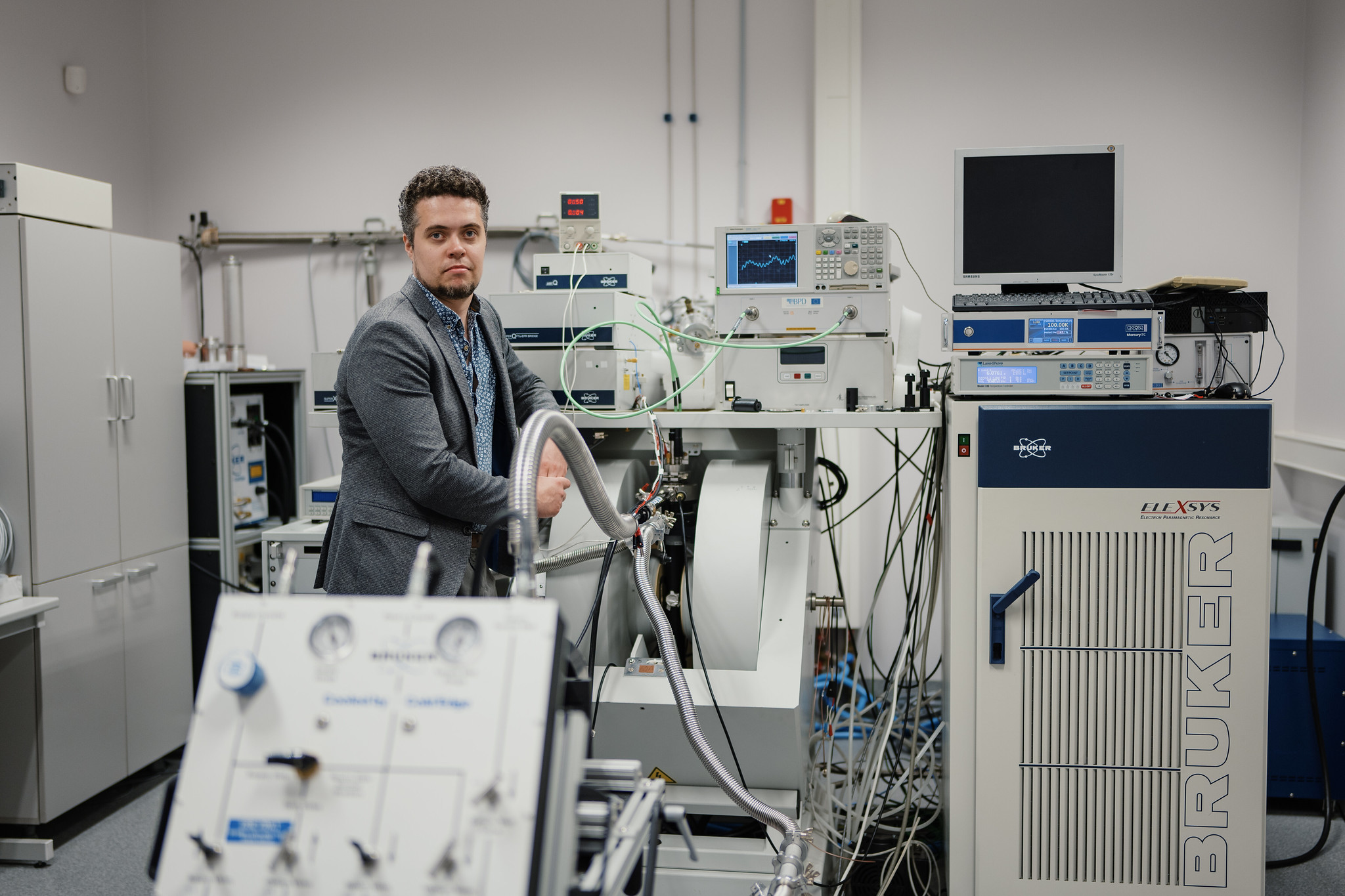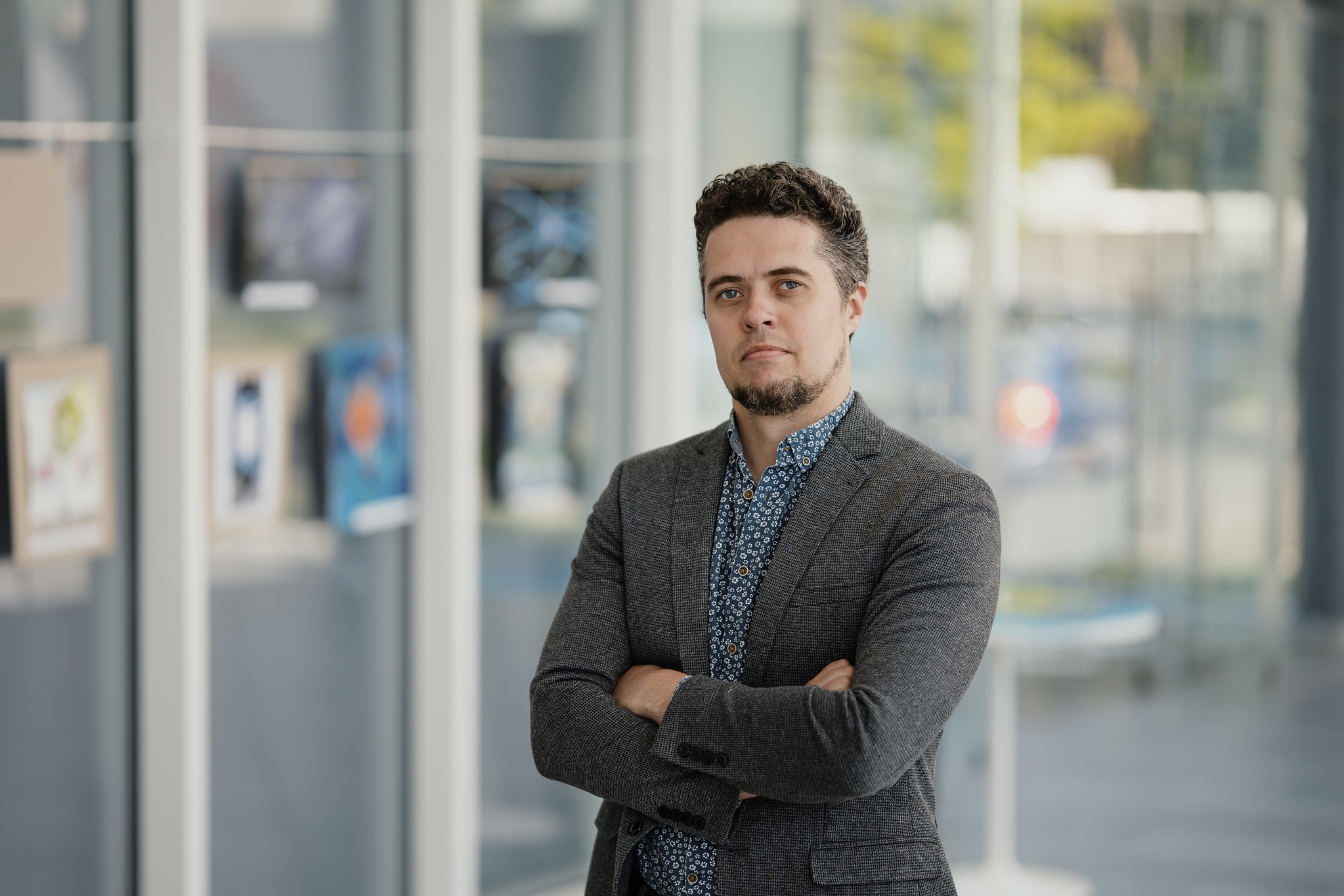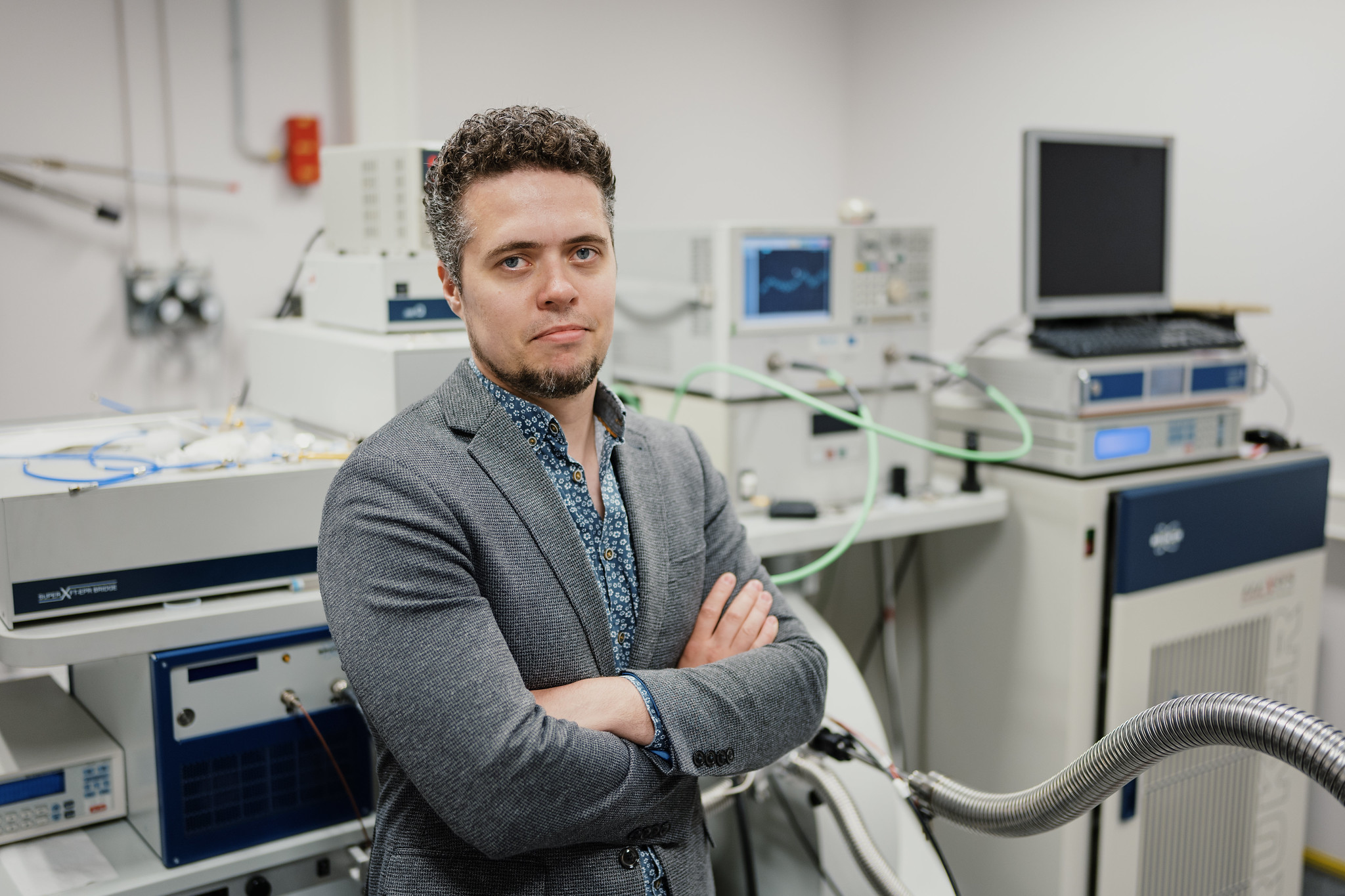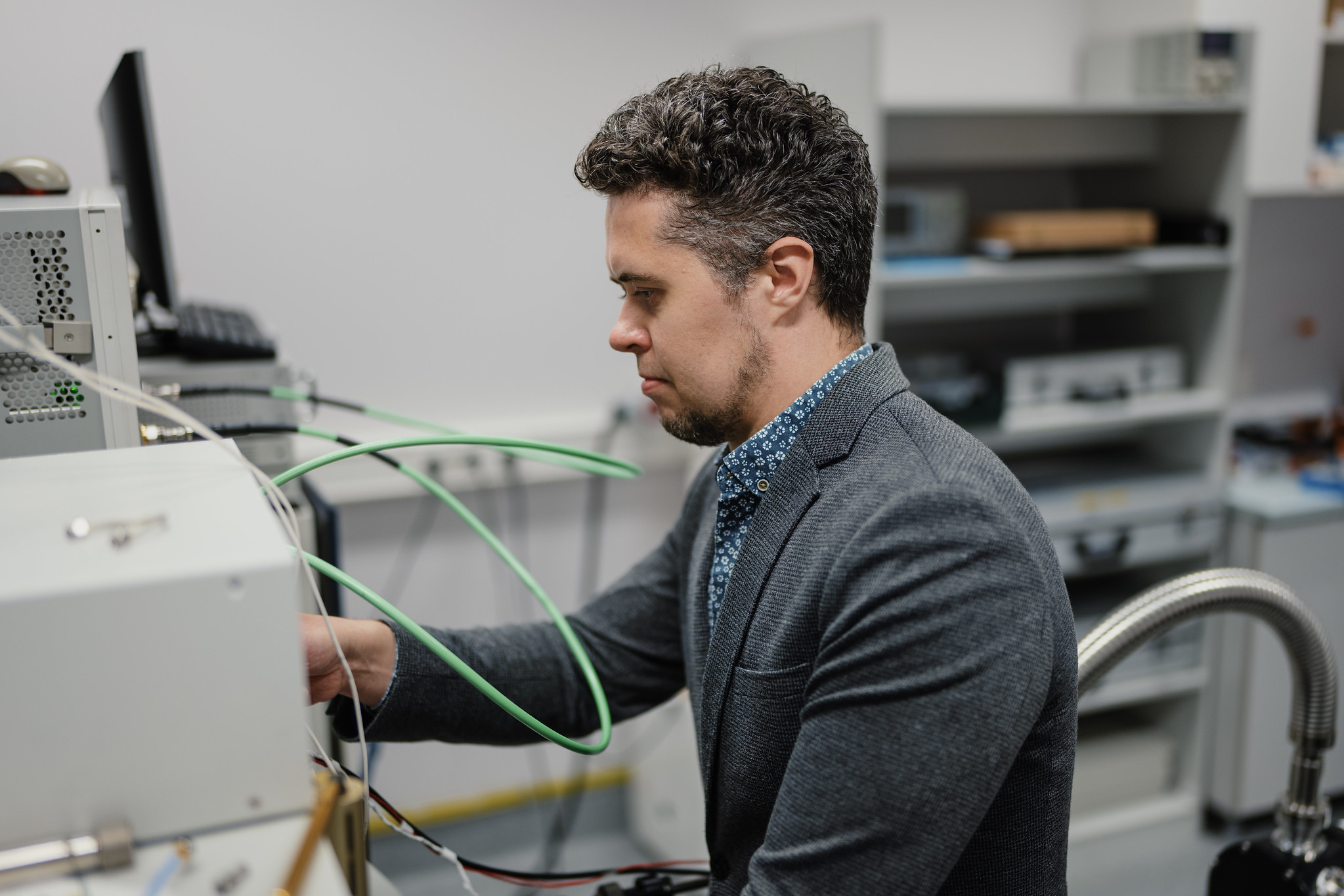Quantum Technologies: Complex Yet World-Changing Solutions for the Future
 To most of us, the quantum world of tiny particles is barely, if at all, familiar. It is based on completely different laws of physics that allow particles to pass through barriers or be in two states at once. Dr Mantas Šimėnas, Assoc.Prof. at the Institute of Applied Electrodynamics and Telecommunications, Faculty of Physics of Vilnius University (VU), says quantum technologies and quantum computers have enormous potential but their development faces both fundamental physics and engineering challenges.
To most of us, the quantum world of tiny particles is barely, if at all, familiar. It is based on completely different laws of physics that allow particles to pass through barriers or be in two states at once. Dr Mantas Šimėnas, Assoc.Prof. at the Institute of Applied Electrodynamics and Telecommunications, Faculty of Physics of Vilnius University (VU), says quantum technologies and quantum computers have enormous potential but their development faces both fundamental physics and engineering challenges.
Quantum physics is not intuitive but scientists find it increasingly familiar
According to Assoc. Prof. Dr Mantas Šimėnas, unlike classical physics, quantum physics is not intuitive and deals with phenomena involving tiny particles.
“From the moment we are born, we start gaining experiences of the world around; therefore, mechanics, optics, electrodynamics, and other areas of classical physics come to us intuitively. In quantum physics, we encounter phenomena like quantum tunneling, quantum entanglement or quantum superposition that do not exist in classical physics. Intuitively grasping these phenomena is difficult as we hardly ever encounter them, but in the world of particles, they are commonplace,” says the scientist.
Quantum tunnelling allows particles to pass through a barrier, while from the classical physics point of view this is not possible. In other words, quantum particles can “tunnel”, i.e., end up on the other side of a barrier. Equally interesting is the phenomenon of quantum superposition, which allows quantum particles to be present in multiple locations or states simultaneously. One example is electron spins, which he studies himself. “Spin is a quantum property of particles, including the electron, which could be described as a small magnet or compass needle obeying the laws of quantum physics. In a quantum superposition, this arrow points simultaneously up and down,” the VU scientist explained.
He points out that scientists still struggle to grasp the philosophy behind quantum physics; nevertheless, researchers have a pretty good handle on quantum physics. We already have the first quantum computers that can solve specific problems.
“While in a classical computer we have a bit and encode the information as 1s and 0s, in a quantum computer we have a quantum bit or qubit. An example of a qubit could be the electron spin, which can be in several states at once. This is what makes it possible to carry out certain calculations extremely quickly,” the scientist said.
Quantum Physics: A search for new medicines and secure communication
Quantum computers are expected to be able to solve highly complex problems that classical computers cannot. Some of the applications of this computer include the search for chemical reactions and new medicines.
“Chemical reactions and medicines development involve molecules that obey the laws of quantum physics. So trying to model a molecule using a classical computer is very challenging, and the bigger the molecule, the more difficult it is to study. This is especially true when modelling proteins or other large molecules, which are very time-consuming tasks. A quantum computer would render these calculations much faster,” Assoc. Prof. M. Šimėnas noted.

A powerful quantum computer also has the potential of becoming a strategic weapon for countries. Present-day bank transfers and other types of confidential information transmission use classical cryptographic encryption algorithms where the information is encoded using certain asymmetric algorithms. While a classical computer would take a very long time to decode this data, quantum computers could handle it as if there’s nothing to it.
“Classical encryption algorithms are expected to, at some point, become vulnerable, giving the first country to build a powerful quantum computer an advantage over other countries. A quantum computer capable of solving these problems does not currently exist, but the number of qubits in quantum computers is increasing rapidly, and the goal is slowly getting closer,” the scientist said.
Quantum physics also provides a solution to the vulnerability of classical encryption algorithms, enabling a new type of data encryption. Here, the information is encoded by the laws of quantum physics, so it will be impossible for anyone to intercept the encoded data undetected.
“A message encoded with quantum physics algorithms cannot be intercepted without leaving a trace, so the communicating participants would know they are being listened to,” the scientist revealed.
Quantum computer does not outperform supercomputer in every area
We currently use supercomputers for compute-intensive tasks but quantum computers that can perform certain specific tasks much faster already exist.
“Back in 2019, Google developed a quantum processor of 53 qubits, which outperformed a classical supercomputer. Despite the fact that the computer was solving a very specific task, it was the first demonstration of quantum supremacy. For the first time in history, a quantum computer has “beaten” a supercomputer,” the scientist said.

Google’s quantum computer solved the problem in minutes whereas a supercomputer would have taken 10,000 years. The exact speed differences are still subject to intense debate, but the supremacy is there either way. On the other hand, the specificity and narrowness of the tasks it can solve remain the main drawback of a quantum computer.
“A quantum computer will possibly be limited to certain specific tasks. Even if we have a task in mind, we may need to adapt a quantum computer to that task. There is a perception that quantum computers will never become universal, but until quite recently the same was true of the classic computers we now use every day, so it’s hard to predict,” the scientist noted.
Exploring materials for quantum memory at VU
Assoc. Prof. Dr M. Šimėnas and his colleagues at University College London are working on materials that could be applied to quantum memory, one of the building blocks of the future quantum computer and quantum internet. The quantum memory researchers are studying is based on electron spins that are placed in silicon and other materials.
“Silicon is a key material in today’s electronics industry, and it is this material that we aim to build quantum memory on. We characterize electron spins in silicon using electron paramagnetic resonance. This technique is somewhat similar to magnetic resonance imaging in medicine, which allows imaging of the patient’s internal organs. In our case, instead of imaging, we measure how long the quantum superposition state of the electron spins, i.e. quantumness, persists. The quantum state of electron spins can be maintained for a few seconds, but we’re looking to extend this time even further,” the scientist said.
Despite the development of quantum computers with an increasing number of qubits, there is still a long way to go before they are put to good use. One of the main challenges is maintaining the quantum state during computation.
“We currently have several different prevailing quantum computer architectures based on different qubit systems and, therefore, with different characteristics. It is still not clear which architecture will be the winner. We study electron spins, but the Google computer I mentioned earlier uses superconducting qubits, very small electrical circuits made up of superconductors that behave like quantum systems. While electron spin qubits maintain their quantum state for a few seconds, superconducting qubits only maintain their quantum state for a few microseconds, a million times less. We are, therefore, considering hybrid quantum computers that have the best features of different architectures,” Assoc. Prof. Dr M. Šimėnas said.
Another extremely difficult challenge in building quantum computers is making qubits interact with each other. This is problematic from both the fundamental physics and engineering points of view.
“We face an ambiguous situation as quantum systems must be very well isolated from ambient noise but, at the same time, qubits need to be able to interact with each other and with the computer control interface. All of this, for the time being, poses a huge number of additional engineering challenges. For example, qubit systems often need to be cooled to near absolute zero temperature,” said the scientist.
Startup inspired by a famous physicist
While working at University College London, Assoc. Prof. Dr M. Šimėnas and his colleagues co-founded a startup developing cryogenic amplifier technology for electron paramagnetic resonance.
“We borrowed the idea to use cryogenic amplifiers for electron paramagnetic resonance from quantum technologies where they are frequently employed to amplify very weak signals. Cryogenic amplifiers are designed to improve the sensitivity of the instrument and reduce measurement times by up to 100 times. So if a regular experiment takes a day or a week, these amplifiers can help complete it in an hour,” the scientist said.
According to Assoc. Prof. Dr M. Šimėnas, they were inspired to set up the startup after working with Prof. John Morton, one of the world’s foremost spin quantum physicists, who brilliantly balances his career in science and business activities.

“My postdoctoral supervisor, Professor John Morton, a physics professor, also contributed to the idea of a startup. Alongside a successful career in science, he has founded several startups that have attracted millions in investment. He was the perfect example of how science and business development can be perfectly aligned if you systematically work towards a goal,” the researcher revealed.
The researcher also notes the established startup culture within University College London, which Lithuania still lacks.
“When I went to London, I expected to bring back good research results, not a startup. University College London highly encourages startups and has special programmes, so once an invention is developed and its applicability assessed, a startup is immediately on the table. Scientists themselves are often risk-averse to investing the right amount of money at the beginning of a startup, so financial support from the university really adds to the motivation and contributes to building a startup culture,” the scientist noted.
Dr M. Šimėnas was also awarded the prestigious Marie Skłodowska-Curie Postdoctoral Fellowship for further application of cryogenic amplifier technologies in electron paramagnetic resonance research. The supervisor of the fellowship is Prof. Jūras Banys.
VU’s research infrastructure keeps pace with the world’s top universities
Asked to compare his research work at University College London, one of the top ten universities in the world, with his work at Vilnius University, Assoc. Prof. Dr M. Šimėnas did not see any major differences.
“The electron paramagnetic resonance infrastructure for research at Vilnius University is certainly just as good as the one I worked with in London. However, University College London does not subject people to so many administrative hassles and the procurement system was much simpler, we acquired the things we needed faster. But this is not a difference between universities, but between countries. The base salary in Lithuania is lower but there are a lot of additional sources of funding, so if we were to put in the effort and desire, we could get to the same level as University College London,” the scientist described his experience.
The Marius Jakulis Jason and Vilnius University foundations contributed to returning Assoc. Prof. Dr M. Šimėnas to Vilnius University by providing scholarships. The scientist admits he always knew he would return to work in Vilnius.
“It was never my intention to stay abroad. Even before I left, I knew I would return to Vilnius University to continue my research. I had a research associate agreement with the VU as I was working in London, so I never really distanced myself from my Alma Mater. London was just a pit stop for me to gain knowledge,” the scientist said.